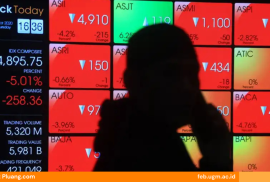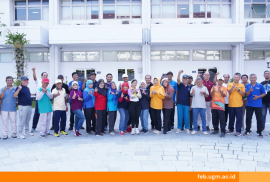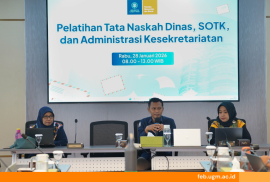Friday (6/10), the Department of Economics, Faculty of Economics and Business, Universitas Gadjah Mada (FEB UGM) hosted the Seminar and Public Lecture (SinarKU) in collaboration with the 7th Mubyarto Public Policy Forum (MPPF). Held at the 8th-floor Auditorium of the FEB UGM Learning Center Building and on the Zoom platform (hybrid), this SinarKU session delved into the economic and political aspects of tobacco regulation and policies in Indonesia. The event featured three speakers with relevant expertise: Prof. Hasbullah Thabrany (Chairman of the National Committee for Tobacco Control), Dr. Elisabeth Kramer (Senior Lecturer at the University of New South Wales), and Gumilang Aryo Sahadewo, S.E., M.A., Ph.D. (Vice Dean for Research, Community Engagement, Collaboration, and Alumni Affairs at FEB UGM).
The event began with the singing of the national anthem, “Indonesia Raya”, and the “Hymne Gadjah Mada.” Subsequently, Dr. Firman Witoelar, representing the Australian National University (ANU) Indonesia Project and serving as the moderator for this seminar, gave a brief introduction and overview of the ANU Indonesia Project. The ANU Indonesia Project is a research institution established by ANU to examine various economic issues in Indonesia.
Following this, the event proceeded with presentations by the three speakers. The first speaker, Prof. Hasbullah Thabrany, the National Committee for Tobacco Control’s Chairman, discussed smoking’s health consequences. Both active and passive smoking have detrimental effects on health. Indonesia is the only country in Asia that has not signed the Framework Convention on Tobacco Control (FCTC) issued by the World Health Organization (WHO), even though this convention serves as the basis for countries to control tobacco consumption among the population.
The Indonesia Central Statistics Agency (BPS) found that cigarettes have become a “basic necessity” for the population. In 2022, 28.26% of adults in Indonesia were smokers. Also, many Indonesians are trapped in poverty and nicotine addiction. According to WHO data, Indonesia has the highest percentage of adult smokers compared to other countries.
However, the paradox lies in the fact that the tobacco industry is considered a fantastic profit generator for the country’s finances. Upon closer inspection, this “contribution” turns out to be only a small part of the company’s profits, paid through income tax (PPh). Meanwhile, excise taxes are mainly borne by consumers, so companies do not have to pay them. However, it cannot be denied that the collected excise taxes significantly contribute to the economy. The urgency of tightening tobacco regulations is crucial. The current political economy in Indonesia has yet to consider the potential losses due to cigarettes, such as health or productivity.
Following this presentation, Dr. Elisabeth Kramer, a Senior Lecturer from the University of New South Wales, explained the importance of government intervention in regulating tobacco. However, complexity arises in regulating addictive products at the national level. It was found that cooperation between ministries in Indonesia is not yet effective in formulating regulations on this matter. Moreover, various scales need to be considered in creating comprehensive laws. Additionally, local factors can affect the implementation of these policies, which need to be mitigated.
In conclusion, she emphasized that tobacco control should be a national priority with support from various government layers. A holistic regulatory framework, such as the FCTC or similar frameworks, must be chosen. The government also needs to consider transitioning away from industry dependence. Meanwhile, tobacco control supporters need to advocate and campaign for this movement so stakeholders can hear the issue.
The material presentation continued with Gumilang Aryo Sahadewo, S.E., M.A., Ph.D., Vice Dean for Research, Community Engagement, Collaboration, and Alumni Affairs at FEB UGM. Prof. Gumilang explained the conditions of tobacco sector workers, including cigarette industry workers, tobacco farmers, and clove farmers. Studies have found that households of tobacco farmers are less prosperous than the prevailing narrative suggests.
The input costs for tobacco farming are relatively high compared to other commodities. Additionally, tobacco farmers incur higher costs in paying wages to workers, given the labor-intensive nature of tobacco farming. Weather fluctuations and the insignificant contribution of profits to households also pose challenges. Based on empirical studies, it was also found that the productivity of workers in the tobacco industry is lower compared to workers in similar sectors. Moreover, there is a gender wage gap among workers, contrary to the reality that the workforce in this sector is predominantly female.
Dr. Gumilang then explained the potential impact of tobacco taxation. Taxes on tobacco or other regulations will decrease cigarette demand but not significantly. A study conducted by Sahadewo et al. (2018) found that a 47% average increase in cigarette tax and simplification of the tax structure into six levels would reduce cigarette demand by 2%, increase government revenue by 6.4%, and decrease gross employment in this industry by less than 0.5%.
On the other hand, the tax increase would reduce employment in the hand-rolled cigarette industry by around 0.22%, equivalent to the loss of jobs for 2,245 workers. The total income lost due to reduced employment is 0.1% of the revenue obtained by the government from tax implementation. Ultimately, tobacco farmers would be better off if they switched to other crops.
This concluded the presentation session by the three speakers. The event continued with a lively question-and-answer session participated enthusiastically by the audience, both those present at the venue and those joining via the Zoom platform. This officially marked the end of the seminar.
This seminar session is one of FEB UGM’s commitments to achieving Sustainable Development Goals (SDGs), specifically goals three and eight. Goal three focuses on reducing tobacco consumption among the population, which can reduce potential negative health impacts. Regarding goal eight, tobacco taxation will have widespread economic implications, including workers’ productivity in the tobacco sector.
Reportage: Rizal Farizi






